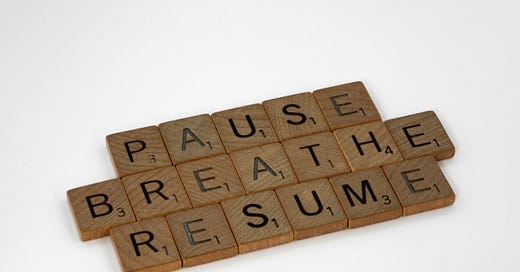Life isn’t always complicated.
But we are.
Right now, this moment—it’s everything.
Not what happened yesterday.
Not what might happen tomorrow.
Just now—and how we choose to respond to it.
The question life keeps asking us is simple:
How will you respond?
A Simple Pattern
Over the years—through books, practice, and plenty of missteps—I’ve found a simple pattern. Its by no means original, but it has become a way for me to meet each moment with intention.
I call it:
The Breath. The Response. The Return.
Just three steps. Nothing fancy. But powerful enough to shift everything.
Neuroscience backs this up:
When we pause before reacting, we activate the prefrontal cortex—the brain’s center for thoughtful decision-making. We quiet the amygdala, our emotional center. This brief pause transforms our responses, and ultimately, our lives.
The Breath
Before anything—
Before you react.
Before you speak.
Before you hit send.
Before you raise your voice.
Breathe.
That breath creates a tiny gap.
It won’t solve everything—but it opens possibilities.
It gives you a choice.
Maybe you’re in a meeting.
Someone cuts you off, takes credit for your idea.
Your chest tightens. The heat rises.
Words sit sharp on your tongue. You want to snap—
Breathe.
Maybe you’re driving.
Your child asks, “Are we there yet?” for the tenth time.
Your jaw clenches. Your patience thins. You feel the irritation rising—
Breathe.
Maybe you’re scrolling.
A comment appears, completely missing your point.
Your fingers hover, ready to fire back. The urge to defend yourself surges—
Breathe.
Maybe you’re at the store.
The cashier is slow, exhausted. The person behind you sighs impatiently.
You’re caught between empathy and frustration—
Breathe.
Maybe you’re exhausted.
Your partner questions something left undone. You feel misunderstood, underappreciated.
The impulse to lash out, to defend yourself, feels overwhelming—
Just breathe.
Different moments. Different triggers.
But each calls for the same pause.
That single breath won’t erase the tension—
but it gives you back your footing.
It lets you choose your response,
rather than let the moment choose it for you.
The Response
After that breath.
Then—and only then—
Respond.
Not from fear.
Not from habit.
Not from the old script someone handed you years ago.
But from awareness.
From clarity.
From the person you’re becoming.
Your voice might still shake.
The emotions might still burn.
But you’re not reacting anymore—you’re choosing.
And that choice?
It changes everything.
Because when we respond instead of react,
we move from survival mode to stewardship.
We become less like a storm
and more like a steady hand in the wind.
⸻
The Return
Later—
Maybe hours later.
Maybe after a restless night.
Maybe seconds after the words leave you.
You reflect:
Did I show up as the person I meant to be?
Did I misread the moment?
Did I protect myself at someone else’s expense?
This is where the real work deepens.
If the answer stings—
Return.
Apologize.
Repair.
Rebuild.
Yes, it’s awkward.
Yes, it’s humbling.
But that act?
That return?
That’s what builds trust.
That’s what makes you someone others rely on.
That’s how you grow.
Because the return isn’t about shame.
It’s about integrity.
It’s about alignment.
It’s about becoming someone who takes responsibility for the impact they have.
Why This Matters
You might be thinking,
“I’ve heard this before. Take a breath, count to ten…”
But this pattern goes deeper.
It’s not just about momentary calm.
It’s about fundamentally shifting how you engage with life.
It’s about cultivating presence as a daily habit.
It’s about building intentional responses, not reactive patterns.
And most importantly—
it’s about committing to return when you inevitably fall short.
I know some of you are wondering:
“What if someone breathes, responds, and still chooses harm?”
The truth is:
If you’re here, reading this—you’re not that person.
Those who intentionally harm rarely pause to reflect.
But you?
You’re trying.
You’re questioning.
You’re growing.
This is for you.
Try This
In the next moment that stirs you up—a conversation, a frustration, a conflict—try this practice:
1. Breathe:
Pause for 3–5 seconds. Feel your feet grounded. Notice what’s happening in your body. Just breathe.
2. Respond:
Ask yourself:
How would the person I aspire to be handle this?
Respond from that place, even if your voice shakes.
3. Return:
Later, reflect honestly. If you missed the mark, circle back within 24 hours. A simple, genuine apology can transform relationships:
“I thought about our conversation—I didn’t handle it the way I intended.”
Building this habit takes practice—typically 4–6 weeks of intentional effort before it becomes natural. You’ll forget sometimes. You’ll slip into old patterns. That’s okay. Progress isn’t linear. The key is to start small and celebrate each time you remember.
And here’s a secret, I fail to do this multiple times everyday. This is a reminder for me as much as it is for anybody!
Its simple.
But not easy.
And absolutely worth it.



